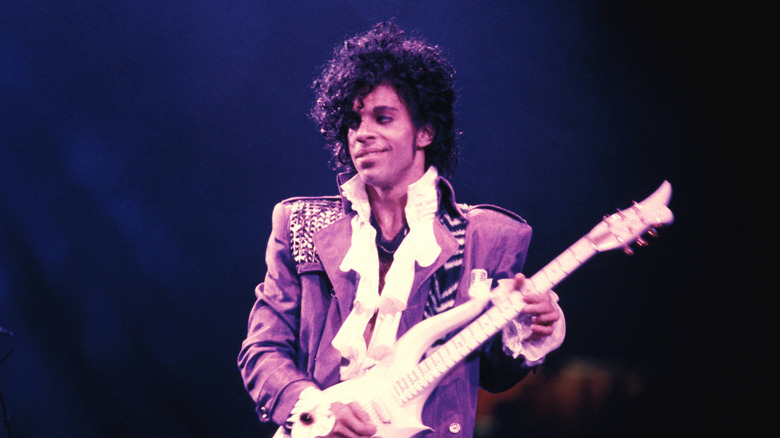Prince's Autopsy Report Has Some Disturbing Details
Prince tragically died on April 21, 2016, concluding a legacy marked by his musical genius, boundary-pushing androgynous style, and dedication to ushering in new generations of talent. His death ignited mourning across the entertainment industry, but it reached far beyond that, too. Then-President Barack Obama even issued a formal statement about Prince's death. "Today, the world lost a creative icon," he said at the time. "Michelle and I join millions of fans from around the world in mourning the sudden death of Prince." He added, "Few artists have influenced the sound and trajectory of popular music more distinctly, or touched quite so many people with their talent. As one of the most gifted and prolific musicians of our time, Prince did it all ..."
News of the legendary singer, producer, and actor's death came as a shock to his legions of devoted admirers around the world, but his autopsy report — released weeks later — gave the world a deeper, more disturbing peek at the demons he was apparently battling behind the scenes. Initially, intrigue and unanswered questions colored the conversation. CNN, for example, reported that the singer, who passed away in Minneapolis at his Paisley Park estate, forwent a funeral and was cremated mere days after his unresponsive body was uncovered in an elevator inside his home. Suicide was immediately ruled out and officials also noted a lack of external trauma on his body. Prince's autopsy report eventually pulled back the curtain on the internal stressors that led to his death.
Prince died of a drug overdose
Unfortunately, Prince's autopsy report revealed that he'd been battling a secret addiction in his personal life. According to the Midwest Medical Examiner's Office, who conducted Prince's autopsy, he overdosed on opioids. Specifically, Prince had high levels of fentanyl — the synthetic, extremely addictive, and deadly opioid — in his system when he passed away. The report also noted that Prince self-administered the fentanyl that ultimately killed him. Finally, Prince, who also had a history of chronic hip pain, had Percocet in his system, too, but its role in his death was undetermined at the time. Only 57 years old at the time, Prince's untimely death was tragic for more reasons than one, but it's been said that he wasn't aware he was in possession of the deadly opioid before ingesting it.
Prince's looming death led to police investigations into members of his inner circle, including physician Dr. Michael Schulenberg, and select staff members. The investigations sought to conclude who'd supplied Prince with the fentanyl that killed him. And though officials were never able to pin fault on one person, they revealed Prince was unaware that the Vicodin — hydrocodone and acetaminophen — he meant to ingest actually contained traces of fentanyl. "In all likelihood, Prince had no idea he was taking a counterfeit pill that could kill him," Carver County attorney Mark Metz shared in April 2018, two years after Prince's death (via NBC News). He continued, "Others around Prince also likely did not know that the pills were counterfeit containing fentanyl."
Schulenberg, who was found to have written Prince prescriptions for other drugs under alternative names, never faced criminal charges, but he was forced to shell out $30,000 due to a "federal civil violation." He denied any involvement in the singer's passing.


